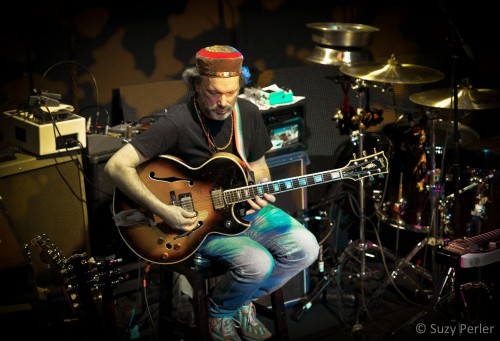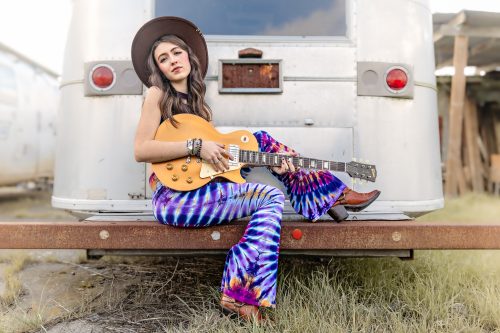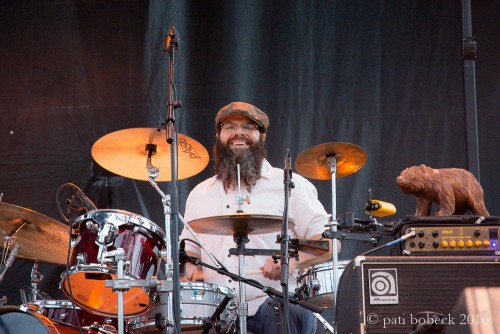By Michael Lello
Steve Kimock plays in so many different configurations that when the guitar wiz is asked to give a rundown of his summer schedule, it’s a difficult query to answer.
“I don’t know if I can do that or not,” Kimock says with a laugh during a recent phone interview. “That’s such a good question, man. I need to start getting up earlier. Well, OK, there’s my own band, and that includes a couple of different variations and that can sometimes have a singer, and it’s a more straight-up ’70s funk and r&b stuff, and sometimes we have two drummers, so there’ll be some varying improvisational moments. That’s my normal thing. I’ve been doing some acoustic Hot Tuna gigs, which are wonderful and hugely satisfying, sit-down acoustic stuff with Jorma [Kaukonen] and Jack Casady and [Barry] Mitterhoff, and that’s pretty different from the standard rock band thing. I’m doing some Everyone Orchestra shows, which are conducted improvisational shows.”
 And that’s not even mentioning his one-off return to Bob Weir’s Ratdog, which was announced the morning of our interview. The Bethlehem, Pa., native will handle lead guitar duties in Weir’s outfit at the Peach Music Festival in Scranton next week, reprising Kimock’s long-standing connection to several Grateful Dead members.
And that’s not even mentioning his one-off return to Bob Weir’s Ratdog, which was announced the morning of our interview. The Bethlehem, Pa., native will handle lead guitar duties in Weir’s outfit at the Peach Music Festival in Scranton next week, reprising Kimock’s long-standing connection to several Grateful Dead members.
We chatted with Kimock – who plays Thursday, Aug. 8 at World Café Live at the Queen in Wilmington, Del., with Bernie Worell, John Kimock and Andy Hess — about playing in the band with Weir, his upcoming solo album, gigging with his drumming son John and more.
H81R: So you’ll be joining up with Bob Weir and Ratdog again for the Peach Festival sets. How did that come about?
SK: I’ve been playing with Weir since the early ’80s. Started, I don’t even know what year it was. I did some gigs with him with, what was his band at the time . . . Kingfish. Yeah, so I did a bunch of Kingfish gigs back in the day, and then miscellaneous stuff with him and some of the other Grateful Dead guys, ’cause I was local in Marin County [California]. I was kind of on call. And have been ever since. Bob and I and his family and my family are close, and when it comes up, I’m on the bench. So I’m on the bench for Ratdog, and if they go, ‘Hey, we need somebody, can you come down?’ I’m like, ‘Yeah, what do you think I’m sitting here for?’
So I’m glad that it worked out that I can cover a little bit of that territory, because I’m a huge fan of Bob’s playing. I’m a big Bob Weir fan on a guitar-playing and musical approach kind of level. I always really enjoyed his stuff, and we have a long and pretty practiced chemistry and rapport, and we get to push each other, and it’s a lot of fun.
H81R: Weir is definitely not the typical rhythm guitarist. What’s unique about his playing style?
SK: What’s unique about his playing style is that it is unique. Where his roots are and what he’s done, just with general concepts and adding it to the Grateful Dead for all those years. His whole purpose of getting between all the elements and gluing them together is really special. So he’s come up with some really unique voicings and rhythmic functions, and there’s just nobody that plays like him. I just really dig his stuff. He’s got such a huge vocabulary of great music and roots that I also appreciate: rural blues and gospel and so forth. He’s a big fan of the odd-time signature stuff, sort of the opposite polarity, and some more elevated harmony.
H81R: When did you begin playing with your son, and when did you realize that he was able going to play professionally?
SK: Oh, boy, that’s another good question. We started playing together pretty much immediately. He got his first drum set when he was two. He just wanted to hit things. And I guess a baseball bat was too big, so it was a drumstick. He started going to gigs, traveling with me, when he was three or four, so he watched the whole thing going down, sitting behind the drums during soundcheck. I think there’s probably a video of him online somewhere at five, hopping behind Greg [Anton’s] kit at Studio E and kind of leading the band through some arrangements, at five. So I had a pretty clear idea early on that he’d be able to handle it a fairly high level, and now he’s 24 and kicking my ass all up and down the street.
 H81R: What it has been like to be able to do this with John?
H81R: What it has been like to be able to do this with John?
SK: There’s nothing else in my life that is as remotely as satisfying, unexpected, karmicly, or something like that, as having a first-born being so musical just all on his own, and loving what he does and loving what I do and loving each other. We’ve always really connected, and it’s just an incredible sort of joy and pride for me. I don’t know, maybe besides the emotional kind of hit from it I get, what I take away most from it would be the value of lineage and coming from a musical family for a young musician. He started early enough, that by the time he had grown into an adult body, he had heard great music; he didn’t pick it up for the first time at 16, like I did. By the time he was 16, he could write and gig and work, and his playing and concepts are just so beautifully advanced, and that’s the value of lineage.
H81R: What else are you working on right now? Any recordings in the works?
SK: Oh yeah, I’m in the middle of overdubs for a record that we started in the spring with Joe Blaney, he produced The Clash and a bunch of bands. He’s been a real inspiration to work with, and we’ll be working tomorrow, we’ll be doing overdubs in my barn here in my little half a studio/barn thing. And that’s exciting. I’m hoping to get that finished up so we can have a new record, a new rock band record, out in fall, and probably not too long after that, now that we’re getting our recording chops together at home, start with just me and Johnny, because he’s been doing some writing that I want to pursue. I’m working at home more acoustic stuff, more slide, Hawaiian guitar, and I’m hoping to get some solo acoustic stuff, probably largely improvisational stuff, out there.
H81R: Tell us a little bit more about the record with Joe Blaney. So you say this more of a straight rock record?
SK: For me, yeah. Just as a format. It’s me and Bernie Worrell and Johnny on drums and Andy Hess on bass and a couple miscellaneous characters. So it will be a nice little record with vocals and songs, that kind of thing, as opposed to the gig vibe, which half the time is a drunken brawl in terms of the production and in some great big noisy rooms.
H81R: Who’s singing?
SK: There’s going to be a couple of singers on it.
 H81R: Are you a lifelong student of your instrument? Do you play all the time, or are you happy to put the guitar down when you can?
H81R: Are you a lifelong student of your instrument? Do you play all the time, or are you happy to put the guitar down when you can?
SK: I’ve never been able to put it down voluntarily, although I understand that there are people that have, that do? I don’t know how they can be that lucky, but I think about it sometimes. I don’t think so. I’m always looking for new sounds, which kind of means starting over. I’m invested in the learning process, which is the part that excites me, being on any kind of accelerated branch and the learning curves are like later-life kind of things. I can play the regular fretted electric guitar in regular tuning, I’ve been playing that since I was 18, and it’s difficult to pick that up and go, ‘Oh, here’s something new’ that I can get all excited about. You basically come against your own personal limitations, so you kind of branch out and see what other music can you find. Is there something that’s not just related to me wiggling my fingers as fast as I can? And you find it. I keep learning and I keep sitting down with other instruments, playing the piano, playing the bass, playing Hawaiian guitar, playing fretless, just trying to keep learning stuff. And if it’s not necessarily pushing the main thing forward directly, the discovery, the joy of doing it is the motivation.




Leave a Reply